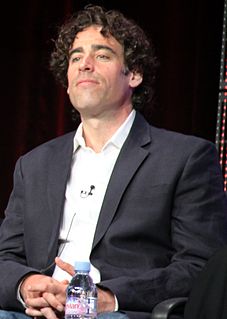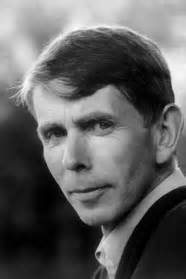A Quote by Stephen Mangan
There's always an anxiety about playing literary characters because one of the great joys of reading books is that you can create your own vision of things.
Related Quotes
One of the nice things about books as opposed to television and movies to some extent is it's not a passive entertainment. People really do get involved, and they do create, and they do have their own visions of what different characters look like and what should happen. It's great - it means their brains are working.
By the time I got to college I had stopped reading books because I wanted to "be cool" and started reading books simply because I wanted to read them. I discovered heroes like Roth, King, Dahl, Shirley Jackson, Patricia Highsmith, TC Boyle, Douglas Adams, Neil Gaiman, David Sedaris. These people weren't trying to "rebel against the literary establishment." They were trying to write great, high-quality books that were as entertaining and moving as possible.
Reading with an eye towards metaphor allows us to become the person we’re reading about, while reading about them. That’s why there is symbols in books and why your English teacher deserves your attention. Ultimately, it doesn’t matter if the author intended the symbol to be there because the job of reading is not to understand the author’s intent. The job of reading is to use stories as a way into seeing other people as a we ourselves.
I believe that to create real-seeming characters, the writer must be willing to go on a voyage of self-exploration. It can be revealing and even painful to explore your own weakness, but it gives you genuine emotion. Characters in fiction come alive because of the believability of their emotional lives and that is what I strive to create.
And if you can find out something about the laws of your own growth and vision as well as those of photography you may be able to relate the two, create an object that has a life of its own, which transcends craftsmanship. That is a long road, and because it must be your own road nobody can teach it to you or find it for you. There are no shortcuts, no rules.
We become attached to certain characters in novels, mostly because they have some mystery attaching to them. We re-read the books, but we're still left wanting to know more. In my own case, it was 'Great Expectations' and Miss Havisham in particular. Luckily, writers have the option of making up the knowledge that reading doesn't supply.
Only idiots or snobs ever really thought less of 'genre books' of course. There are stupid books and there are smart books. There are well-written books and badly written books. There are fun books and boring books. All of these distinctions are vastly more important than the distinction between the literary and the non-literary.
The deep-read is when you get gut-hooked and dragged overboard down and down through the maze of print and find, to your amazement, you can breathe down there after all and there’s a whole other world. I’m talking about the kind of reading when you realize that books are indeed interactive. . . . I’m talking about the kind of deep-read where it isn’t just the plot or the characters that matter, but the words and the way they fit together and the meandering evanescent thoughts you think between the lines: the kind of reading where you are fleetingly aware of your own mind at work.
The great thing about acting is, because you're constantly playing other characters and exploring yourself because you have to find those other characters in yourself, you sort of broaden as a person over your life because you've been other people. So you can empathize with many different sorts of people. It's great in that way and I hope, therefore, as you get older as an actor, you not only get more interesting because you lived more, but you get a bit wiser as a person.
It's funny what [producer Richard Zanuck said about even though you can't quite place when the book or the story came into your life, and I do vaguely remember roughly five years old reading versions of Alice in Wonderland, but the thing is the characters. You always know the characters. Everyone knows the characters and they're very well-defined characters, which I always thought was fascinating. Most people who haven't read the book definitely know the characters and reference them.


































